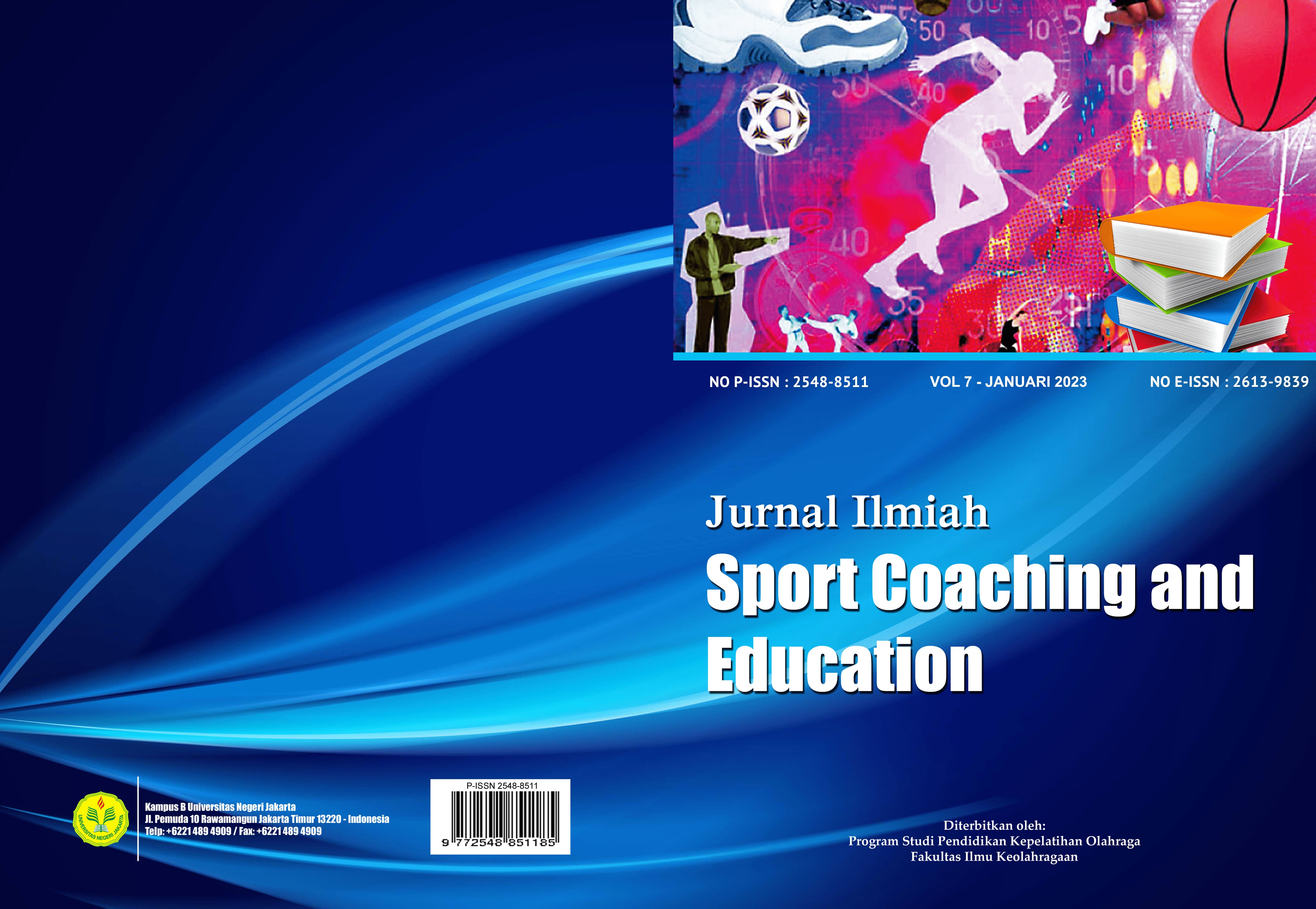Peran Orangtua dalam Mendukung Prestasi Olahraga Panahan Klub Focus Archery Center
DOI:
https://doi.org/10.21009/JSCE.07101Keywords:
Peran orangtua, Prestasi olahraga, PanahanAbstract
ABSTRAK
Penelitian ini bertujuan untuk mengetahui prosentase peran orangtua dalam mendukung prestasi atlet panahan klub Focus Archery Center. Penelitian dilaksanakan pada bulan Juni 2022. Pengambilan data ini dilakukan di lapangan Klub Fokus Archery Center dengan menggunakan media Handphone masing - masing. Metode penelitian yang digunakan adalah metode deskriptif dengan teknik survey. Instrument penelitian ini berupa angket tertutup yang dibuat dalam bentuk google form dan dibagikan kepada seluruh sampel. Jumlah sampel sebanyak 27 orang yang merupakan populasi dari orang tua dari atlet focus archery center. Berdasarkan hasil penelitian maka dapat disimpulkan prosentase keseluruhan peran orangtua dalam mendukung prestasi olahraga panahan klub Focus Archery Center berada pada kategori sedang yaitu 44,4%.
Kata kunci: Peran Orang Tua, Prestasi Olahraga, Panahan
ABSTRACT
This study aims to determine the percentage of the role of parents in supporting the achievement of archery athletes at the Focus Archery Center club. The research was carried out in May 2022. This data collection was carried out in the Field of the Archery Center Focus Club using the respective mobile media. The research method used is a descriptive method with a survey technique. The instrument of this research is a closed questionnaire made in the form of a google form and distributed to all samples. The number of samples as many as 27 people who are the population of parents of athletes from the archery center focus. Based on the results of the study, it can be concluded that the percentage of the overall role of parents in supporting the archery achievement of the Focus Archery Center club is in the medium category, which is 44.4%.
Keyword: The Role Of Parents, Sports Achievements, Archery
References
Association of Certified Fraud Examiners(ACFE). (2020). Report to the Nations 2020 Global Study on Occupational Fraud and Abuse.
Adiputra, I. M. P., Utama, S., & Siregor, S. V. N. (2017). Kualitas Laporan Keuangan dan Pengendalian Internal, Terhadap Efisiensi Investasi.EKUITAS (Jurnal Ekonomi dan Keuangan), 2(3), 293–312. https://doi.org/10.24034/j25485024.y2018.v2.i3.3965
Angela, W., & Aryancana, R. (2017). The Effect of Financial Reporting Quality on Financing and Investment. Etikonomi, 16(1), 81–92. https://doi.org/10.15408/etk.v16i1.4600.
Alfia, F. S. D., & Anwar, S. (2021). Pengaruh Earnings Management Sebagai Perantara Fraud Pentagon Terhadap Pendeteksian Fraudulent Financial Reporting. Prosiding Seminar Nasional Akuntansi, 1(1), 497–505.
Assad, N. F., & Alshurideh, M. T. (2020). Financial Reporting Quality, Audit Quality, and Investment Efficiency: Evidence GCG Economies. 11(3), 194–208. https://doi.org/10.4108/eai.21-11-2018.2282299.
Aulia, D., & Siregar, S. V. (2018). Financial Reporting Quality, Debt Maturity, and Chief Executive Officer Career Concerns on Investment Efficiency. BAR -Brazilian Administration Review, 15(2), 1–16. https://doi.org/10.1590/1807-7692bar2018170120
Azani, P. K., Rahman, A., &Yohana, D. (2019). Financial Reporting Quality , Debt Maturity and Investment Efficiency in Companies Listed on the Warsaw Stock Exchange in 2015-2017. Zeszyty Naukowe Uniwersytetu Szczecińskiego Finanse Rynki Finansowe Ubezpieczenia, 82(9), 249–259. https://doi.org/10.18276/frfu.2016.4.82/2-20
Beneish, M. D. (1999). The Detection of Earnings Manipulation. Financial Analysts Journal, 55(5), 24–36. https://doi.org/10.2469/faj.v55.n5.2296.Biddle, G. C., Hilary, G., & Verdi, R. S. (2009). How Does Financial Reporting Quality Relate to Investment Efficiency? Journal of Accounting and Economics, 48(2–3), 112–131. https://doi.org/10.1016/j.jacceco.2009.09.001.
Bzeouich, B., Lakhal, F., & Dammak, N. (2019). Earnings Management and Corporate Investment Efficiency: Does the Board of Directors Matter? Journal of Financial Reporting and Accounting, 17(4), 650–670. https://doi.org/10.1108/JFRA-06-2018-0044
Denziana, A. (2015). The Effect of Audit Committee Quality and Internal Auditor Objectivity on the Prevention of Fraudulent Financial Reporting and the Impact on Financial Reporting Quality (A Survey on State-Owned company in Indonesia). International Journal of Monetary Economics and Finance, 8(2), 213–227. https://doi.org/10.1504/IJMEF.2015.070784.
Deva, B., & Machdar, N. M. (2017). Pengaruh Manajemen Laba Akrual dan Manajemen Laba Riil Terhadap Nilai Perusahaan dengan Good Corporate Governance sebagai Variabel Pemoderasi. https://dspace.uii.ac.id/handle/123456789/8287.
Dingkorici Akasumbawa, M. D., & Haryono, S. (2021). Pengaruh Kualitas Laporan Keuangan dan Debt Maturity Terhadap Efisiensi Investasi Dengan Good Corporate Governance sebagai Variabel Moderasi: Studi pada Perbankan Go Public Di Indonesia. PERFORMANCE: Jurnal Bisnis & Akuntansi, 11(1), 28–42. https://doi.org/10.24929/feb.v11i1.1320.
Elaoud, A., & Jarboui, A. (2017). Auditor specialization, accounting information quality and investment efficiency. Research in International Business and Finance, 42(July), 616–629. https://doi.org/10.1016/j.ribaf.2017.07.006.Elena, M. “Kementerian PPN/Bappenas Targetkan ICOR Turun Jadi 6,24 di 2022” Bisnis.com, 29 April 2021, https://ekonomi.bisnis.com/read/20210429/9/1388092/kementerian-ppnbappenas-targetkan-icor-turun-jadi-624-di-2022.
Euromonitor International (2021). Real GDP Growth: Euromonitor International from National Statistics/Eurostat/OECD/UN/International Monetary Fund (IMF), World Economic Outlook (WEO). Economies and Consumers Annual Data Historical.
Fajriani, A., Wijaya, S. Y., & Widyastuti, S. (2021). Determinasi Efisiensi Investasi. Konferensi Riset Nasional Ekonomi, Manajemen, Dan Akuntansi, 2, 1541–1554.Farmashinta, P., & Yudowati, S. P. (2019). Pengaruh Fraud Pentagon Terhadap Kecurangan Laporan Keuangan (Studi pada Sektor Industri Barang Konsumsi yang Terdaftar Di BEI Periode 2015-2017). Jurnal Akuntansi, Audit dan Sistem Informasi Akuntansi, 3(9), 349–363.
Firmansyah, A., & Triastie, G. A. (2020). The role of Corporate Governance in Emerging Market: Tax Avoidance, Corporate Social Responsibility Disclosures, Risk Disclosures, and Investment Efficiency. Journal of Governance and Regulation, 9(3), 8–26. https://doi.org/10.22495/jgrv9i3art1.
Fonseka, M., Samarakoon, L. P., Tian, G. L., & Seng, R. (2021). The Impact of Social Trust and State Ownership on Investment Efficiency of Chinese firms. Journal of International Financial Markets, Institutions and Money, 74, 1–28. https://doi.org/10.1016/j.intfin.2021.101394.
Gomariz, M. F. C., & Ballesta, J. P. S. (2013). Financial reporting quality, debt maturity and investment efficiency. Journal of Banking and Finance, 40(1), 494–506. https://doi.org/10.1016/j.jbankfin.2013.07.013.
Gusmawan, F., & Novita, N. (2017). Kualitas Pelaporan Keuangan, Diversitas Manajerial dan Efisiensi Investasi. Jurnal Ekonomi, Manajemen dan Perbankan, 3(2), 56–66.
Hidayat, S. B. D., & Mardijuwono, A. W. (2021). The Effect of Accounting Information Quality on Investment Efficiency with Auditor Specialization as Moderating Variables. Review of International Geographical Education Online, 11(4), 320–329. https://doi.org/10.33403/rigeo.800649.
Hołda, A. (2020). Using the Beneish M-score model: Evidence from Non-financial Companies Listed on the Warsaw Stock Exchange. Investment Management and Financial Innovations, 17(4), 389–401. https://doi.org/10.21511/imfi.17(4).2020.33.
Houcine, A., & Kolsi, M. C. (2017). The Effect of Financial Reporting Quality on Corporate Investment Efficiency: Evidence from the Tunisian Stock Market. Research in International Business and Finance, 1–34. https://doi.org/10.1016/j.ribaf.2017.07.066.
Hung, D. N., Van, V. T. T., & Phuong, N. T. T. (2020). Impacts of earnings quality and debt maturity on investment efficiency: Study case in Vietnam. International Journal of Financial Research, 11(4), 421–431. https://doi.org/10.5430/ijfr.v11n4p421.
Jensen, M. C., & Meckling, W. H. (1976). Theory Of The Firm: Managerial Behavior Agency Costs and Ownership Structure. Financial Economics, 3, 305–360. https://doi.org/10.1177/0018726718812602.
Kothari, S. P., Leone, A. J., & Wasley, C. E. (2005). Performance Matched Discretionary Accrual Measures. Journal of Accounting and Economics, 39(1), 163–197. https://doi.org/10.1016/j.jacceco.2004.11.002.
Kurniawansyah, D. (2018). Apakah Manajemen Laba Termasuk Kecurangan ? : Analisis Literatur. Jurnal Riset Akuntansi Dan Bisnis Airlangga, 3(1), 341–356. https://doi.org/10.31093/jraba.v3i1.97.
Lai, S. M., & Liu, C. L. (2017). Management Characteristics and Corporate Investment Efficiency. Asia-Pacific Journal of Accounting and Economics. https://doi.org/10.1080/16081625.2016.1266270.
Manik, T. (2020). Analisis Pengaruh Pencegahan Kecurangan Akuntansi Terhadap Kualitas Laporan Keuangan Dengan Tata Kelola Pemerintahan Daerah sebagai Variabel Pemoderasi. Jurnal Ilmiah Akuntansi Dan Finansial Indonesia, 3(2), 49–62. https://doi.org/10.31629/jiafi.v3i2.2229.
Nugroho, A. H. D., Alfasadun, Ardinata, M., & Ambarsari, R. Y. (2021). The Effectiveness of Pentagon Fraud in Detecting Fraudulent Financial Reporting: Usingthe Beneish Model in Manufacturing Companies on the Indonesia Stock Exchange. Proceedings of the 3rd International Conference on Banking, Accounting, Management and Economics (ICOBAME 2020), 169, 389–394. https://doi.org/10.2991/aebmr.k.210311.078.
Nurhayati, & Muniarty, P. (2018). Pengaruh Sistem Pengendalian Internal dan Asimetri Informasi Terhadap Kecenderungan Kecurangan Akuntansi serta Dampaknya Terhadap Kualitas Laporan Keuangan. Valid Jurnal Ilmiah, 15(2), 125–135. http://journal.stieamm.ac.id/index.php/valid/article/view/33.
Rad, S. S. E., Embong, Z., Mohd-Saleh, N., & Jaffar, R. (2016). Financial Information Quality and Investment Efficiency: Evidence from Malaysia. Asian Academy of Management Journal of Accounting and Finance, 12(1), 129–151.
Sakti, A. M., & Septiani, A. (2015). Pengaruh Kualitas Pelaporan Keuangan dan Jatuh Tempo Utang Terhadap Efisiensi Investasi. 4, 1–10.Saputra, A. A. D., & Wardhani, R. (2017). Pengaruh efektivitas dewan komisaris, komite audit dan kepemilikan institusional terhadap Efisiensi Investasi. Jurnal Akuntansi & Auditing Indonesia, 21(1), 24–36. https://doi.org/10.20885/jaai.vol21.iss1.art3
Saputri, U. T. (2020). Kualitas Informasi Akuntansi Koneksi Politik dan Efisiensi Investasi. Angewandte Chemie International Edition, 6(11), 951–952., 3(2), 28–36.Septriyani, Y., & Handayani, D. (2018). Mendeteksi Kecurangan Laporan Keuangan dengan Analisis Fraud Pentagon. Jurnal Akuntansi, Keuangan dan Bisnis, 11(1), 11–23. http://jurnal.pcr.ac.id.
Shahzad, F., Rehman, I. U., Hanif, W., Asim, G. A., & Baig, M. H. (2019). The Influence of Financial Reporting Quality and Audit Quality on Investment Efficiency: Evidence from Pakistan. International Journal of Accounting and Information Management, 27(4), 600–614. https://doi.org/10.1108/IJAIM-08-2018-0097.
Shuraki, M. G., Pourheidari, O., & Azizkhani, M. (2020). Accounting Comparability, Financial Reporting Quality and Audit Opinions: Evidence from Iran. Asian Review of Accounting, 29(1), 42–60. https://doi.org/10.1108/ARA-06-2020-0087.
Simanungkalit, E. R. (2017). Pengaruh Tata Kelola Perusahaan dan Struktur Kepemilikan Terhadap Efisiensi Investasi Perusahaan. Jurnal Akuntansi Bisnis, 15(2), 179–199.
Sitorus, R. R., & Murwaningsari, E. (2019). Do Quality of Financial Reporting and Tax Incentives Effect on Corporate Investment Efficiency with Good Corporate Governance as Moderating Variables? Journal of Accounting, Business and Finance Research, 6(1), 27–35. https://doi.org/10.20448/2002.61.27.35.
Tran, Q. T. (2020). Foreign Ownership and Investment Efficiency: New Evidence from An emerging Market. International Journal of Emerging Markets, 15(6), 1185–1199. https://doi.org/10.1108/IJOEM-07-2019-0573.
Umiyati, I., & Riyanto, R. (2019). Financial Statement Quality and Investment Efficiency. Accruals, 3(1), 131–138. https://doi.org/10.35310/accruals.v3i1.45.
Utomo, L. P. (2018). Kecurangan dalam Laporan Keuangan “Menguji Teori Froud Triangle.” Jurnal Akuntansi dan Pajak, 19(1), 77. https://doi.org/10.29040/jap.v19i1.241Wasita, A. (2020). "Sektor "Consumer Good" Jadi Idola Investor Saham Saat Pandemi" Antara, 2 September 2020, https://www.antaranews.com/berita/1701454/sektor-consumer-good-jadi-idola-investor-saham-saat-pandemi.
Yesiariani, M., & Rahayu,I. (2017). Jurnal Akuntansi & Auditing Indonesia Deteksi Financial Statement Fraud : Pengujian dengan Fraud Diamond. 21(1).
Zulzilawati, & Wahyuni, N. (2021). Beneish Ratio Index sebagai Alat Deteksi Kecurangan Laporan Keuangan pada Perusahaan Manufaktur. Jurnal Akuntansi (e-Journal), 12(2), 181–193.



